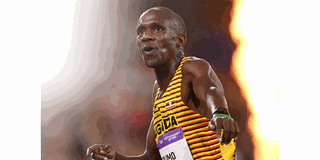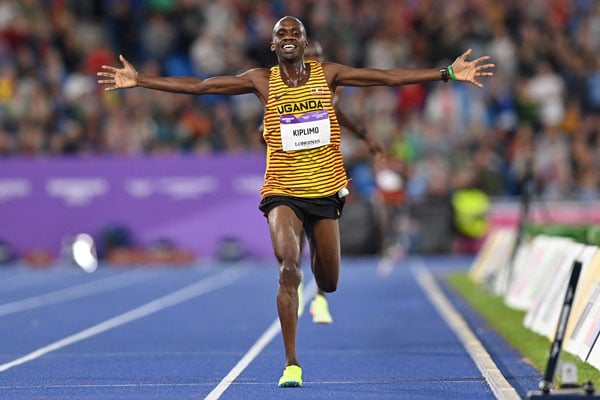Monitor @30 and Uganda’s rising athletics glory

Mr Jacob Kiplimo celebrates after winning the men’s 10,000m final at the Commonwealth Games in Birmingham, England, this week. PHOTO/ AFP
What you need to know:
- Now that the celebration of 30 years has been done, it is important we take very seriously the challenge that this digital disruption is causing the news industry.
This week, so many things happened. First is the breakfast last Thursday in Kampala to commemorate Monitor’s 30th anniversary. It is well worth celebrating, but I am wary of losing sight of the bigger picture.
The last 20 years, and particularly the last 12 years, have seen an epochal shift in the global economy and society, from the 200-year old analogue and industrial order, to a digital order enabled by the Internet and digital technology.
A large number of traditional industries, from retail shopping to publishing, news, hotel and travel and others have been severely disrupted by this digital revolution.
Now that the celebration of 30 years has been done, it is important we take very seriously the challenge that this digital disruption is causing the newspaper and news industry in general.
Monitor needs to think much more strategically and study the trends in new media and digital technology very closely indeed.
This is because power has shifted from news publishers and producers and into the hands (literally) of consumers, whose main platform by which to access news is now the smartphone.
Given an over-abundance of news and general information, the newspaper’s and magazine’s traditional role as the public noticeboard has been radically shaken up by social media and there is no going back.
So serious and steep is the challenge facing print newspapers that I am more nervous for Monitor than I am in celebrating the last 30 years. A whole new rethink is required in the media industry.
50 years since expulsion of Asians
Last week also marked the 50th anniversary of the expulsion in August 1972 of thousands of non-citizen Ugandan Indians by the Idi Amin government.
At the time, 50 years ago, it was received with jubilation by Ugandans who often felt upstaged by the Asians in business and who alleged racist tendencies on the part of the Asians.
With that expulsion began a 25-year period of scarcity, economic contraction, and the erosion of Uganda’s upcountry towns.
It would take a wholesale privatisation of the economy starting in the early 1990s, the arrival of South African investment in Uganda and much of sub-Saharan Africa in the mid-1990s, the shift to digital technology in the late 1990s, and heavy Chinese investment and construction and rehabilitation of infrastructure, for Uganda’s economy to finally return just to where it was in 1972.
By 2022, the Asians who returned were back to where they were in 1972, dominant in retail trade, the hotel industry, foreign exchange, and other services.
The lesson is that while nationalism is fine for a country, pragmatism is even more important for an economy.
Sometimes, the people who are not very popular are just what an economy needs and countries like Zimbabwe and South Africa are in the grip of this stark reality.
Uganda should not have allowed populist political sentiment to disrupt the economy by expelling the Asians.
Uganda, a rising global athletics power
In 1972, at the Munich Summer Olympic Games, John Akii-Bua of Uganda won the men’s 400 metres hurdles event in a new world record time of 47.82 seconds.
It was Uganda’s first-ever Olympic gold medal and for 40 years until Stephen Kiprotich’s gold in the men’s marathon at the London Summer Olympic Games in 2012, it was Uganda’s only Olympic gold.
Since then, success has bred success until a new attitude of self-confidence is leading to a steady stream of gold medals at the highest level of athletics, at the Olympics and the World Championships, the Commonwealth Games to the African championships and Europe’s Diamond League athletics series.
Uganda has now become fully established as the world’s third power in long-distance athletics behind Ethiopia and Kenya, something that seemed unthinkable only 20 years ago.
It’s difficult for younger Ugandans who did not live through that 40-year drought, to appreciate how much this means.
For perspective, more than three-quarters of Africa’s 54 independent countries have never won an Olympic gold medal.
Uganda’s neighbours like Tanzania and Rwanda with organised sporting leagues and governments with the will to support sports, are still waiting for that elusive Olympic gold medal.
We can now become complacent and start to take Uganda’s rise on the world long-distance athletics scene for granted; but it is one not to be taken so.
Mbale flash floods
The tragedy of the flash floods that struck the Elgon region last week, as they have done many times in recent years at the start of the August-September rain season, were a reminder of nature’s ability to disrupt our lives.
It would be tempting to leap to the obvious step of condemning government for doing nothing to prevent the floods that regularly batter Mbale and Kasese, but regular reports of flooding and mudslides in much more affluent countries such as Germany, Australia, and the United States show that even the most organised of countries will at some point be left helpless.
It’s hard, therefore, to know what to say in the face of the Mbale floods, except to pray for and with the victims and the displaced.





